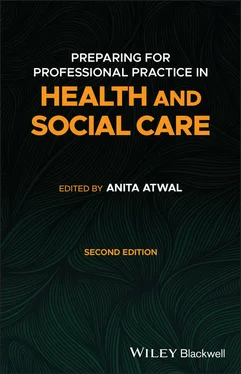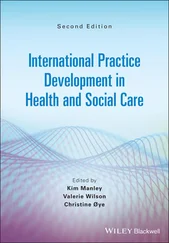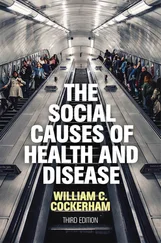Preparing for Professional Practice in Health and Social Care
Здесь есть возможность читать онлайн «Preparing for Professional Practice in Health and Social Care» — ознакомительный отрывок электронной книги совершенно бесплатно, а после прочтения отрывка купить полную версию. В некоторых случаях можно слушать аудио, скачать через торрент в формате fb2 и присутствует краткое содержание. Жанр: unrecognised, на английском языке. Описание произведения, (предисловие) а так же отзывы посетителей доступны на портале библиотеки ЛибКат.
- Название:Preparing for Professional Practice in Health and Social Care
- Автор:
- Жанр:
- Год:неизвестен
- ISBN:нет данных
- Рейтинг книги:3 / 5. Голосов: 1
-
Избранное:Добавить в избранное
- Отзывы:
-
Ваша оценка:
- 60
- 1
- 2
- 3
- 4
- 5
Preparing for Professional Practice in Health and Social Care: краткое содержание, описание и аннотация
Предлагаем к чтению аннотацию, описание, краткое содержание или предисловие (зависит от того, что написал сам автор книги «Preparing for Professional Practice in Health and Social Care»). Если вы не нашли необходимую информацию о книге — напишите в комментариях, мы постараемся отыскать её.
Preparing for Professional Practice in Health and Social Care
Preparing for Professional Practice in Health and Social Care
Preparing for Professional Practice in Health and Social Care — читать онлайн ознакомительный отрывок
Ниже представлен текст книги, разбитый по страницам. Система сохранения места последней прочитанной страницы, позволяет с удобством читать онлайн бесплатно книгу «Preparing for Professional Practice in Health and Social Care», без необходимости каждый раз заново искать на чём Вы остановились. Поставьте закладку, и сможете в любой момент перейти на страницу, на которой закончили чтение.
Интервал:
Закладка:
14 Index
15 End User License Agreement
Guide
1 Cover
2 Title page Preparing for Professional Practice in Health and Social Care Second Edition Edited by Anita Atwal Associate Professor London South Bank University London, UK
3 Copyright
4 Table of Contents
5 Contributors List
6 Introduction
7 Begin Reading
8 Index
9 End User License Agreement
Pages
1 i
2 ii
3 iii
4 iv
5 v
6 vi
7 vii
8 viii
9 ix
10 x
11 xi
12 xii
13 xiv
14 xv
15 xvi
16 1
17 2
18 3
19 4
20 5
21 6
22 7
23 8
24 9
25 10
26 11
27 12
28 13
29 14
30 15
31 16
32 17
33 18
34 19
35 20
36 21
37 22
38 23
39 24
40 25
41 26
42 27
43 28
44 29
45 30
46 31
47 32
48 33
49 34
50 35
51 36
52 37
53 38
54 39
55 40
56 41
57 42
58 43
59 44
60 45
61 46
62 47
63 48
64 49
65 50
66 51
67 52
68 53
69 54
70 55
71 56
72 57
73 58
74 59
75 60
76 61
77 62
78 63
79 64
80 65
81 66
82 67
83 68
84 69
85 70
86 71
87 72
88 73
89 74
90 75
91 76
92 77
93 78
94 79
95 80
96 81
97 82
98 83
99 84
100 85
101 86
102 87
103 88
104 89
105 90
106 91
107 92
108 93
109 94
110 95
111 96
112 97
113 98
114 99
115 100
116 101
117 102
118 103
119 104
120 105
121 106
122 107
123 108
124 109
125 110
126 111
127 112
128 113
129 114
130 115
131 116
132 117
133 118
134 119
135 120
136 121
137 122
138 123
139 124
140 125
141 126
142 127
143 128
144 129
145 130
146 131
147 132
148 133
149 134
150 135
151 136
152 137
153 138
154 139
155 140
156 141
157 142
158 143
159 144
160 145
161 146
162 147
163 148
164 149
165 150
166 151
167 152
168 153
169 154
170 155
171 156
172 157
173 158
174 159
175 160
176 162
177 163
178 164
179 165
180 166
Contributors List
Chapter 1:
Keith WalkerAssociate Head University of Plymouth Plymouth, UK
Alison WarrenAssociate Professor for Occupational Therapy University of Plymouth Plymouth, UK
Chapter 2:
SH CedarChaplain Kings College London London, UK
Chapter 3:
Daniel RodgerSenior Lecturer in Perioperative Practice London South Bank University London, UK
Chapter 4:
Musharrat J.Ahmed-LanderyouSenior Lecturer London South Bank University London, UK
Chapter 5:
Kalimah IbrahiimOccupational Therapists King’s College NHS Foundation Trust London, UK
Chapters 5, 6, 7:
Anita AtwalAssociate Professor London South Bank University London, UK
Chapter 8:
Adéle Stewart-LordDirector of Research and Enterprise London South Bank University London, UK
Contributor of service user sections
Shani ShamahEngagement and Involvement Specialist Stroke Advocate and Counsellor London, UK
Introduction
Anita Atwal
Preparing for Allied Health Professional Practice in Health and Social Care
The purpose of this textbook is to prepare students and newly registered Allied Health Professionals (AHPs) for professional practice. The book is aimed at all members from the fifteen AHPs registered with the Health and Care Professions Council (HCPC) in the United Kingdom (UK). This is the second edition of a book that was originally written to prepare occupational therapy and physiotherapy students for the transition between student and registered clinician. The rationale for the book in 2009 was that few books were interprofessional, and embedded within professional practice. This rationale remains equally valid; however, this updated volume reflects the fact that standards of practice and expectations from both regulators and service users have changed. Moreover, there is a vital emphasis on leadership, quality assurance, equality and diversity, and co-production.
Co-production is central to Allied Health Practice because it moves the power away from professionals towards service users, and challenges the assumption that service users are passive recipients of care. This in turn elevates the service user/clinician relationship to an equal and reciprocal partnership. It is the process by which service users, carers, and health and social care professionals work together to achieve patient-led and patient-centred services and outcomes (Cahn 2000). Some chapters also contain service-user perspectives or insights (usually written in first person).
A ‘professional’, in the context of this book, describes someone who is registered with the statutory regulator, which in the UK is the HCPC; and who can demonstrate a high level of expertise in their area of health and social care. The role of the regulator is to protect the public. It does this by setting professional and education standards, keeping a register of professionals who meet their standards, and taking action to address a registrant who is failing to meet those standards. The HCPC provides ‘Standards of Proficiency’ for each of the professions it regulates; registrants must meet these standards to register, and to remain registered. These standards describe the duties and behaviour expected from registrants, and a failure to uphold any of the standards can render a student or registrant unfit to practice, either temporarily or permanently.
The book chapters will focus on the HCPC professional competencies for AHPs; although the principles covered will also be relevant to AHP students and professionals from other countries that follow similar standards of practice. This means that the book should help clarify expectations from a regulatory body. It may not provide all of the answers but we hope that it will enhance knowledge and provide advice that improves professional practice. In the first instance it is recommended to read the book chapters in order as the content builds on the preceding chapters. Each chapter begins with an overview and concludes with Key Take Home Messages.
Chapter 1relates to the HCPC standards about critical reflection and drawing on relevant information to inform and review practice. Reflective practice enables us to critically analyse our professional practice in a way that leads to development and improvement. It is therefore an integral part of improving quality in health and social care.
Chapter 2introduces the concept of self-care as a means to enable AHPs to adapt in the face of challenging circumstances. Professional practice can be challenging, and this in turn can affect our own physical and mental health. The chapter on self-care and caring reflects recent changes in health care practices, but also emphasises the importance of AHPs developing coping strategies to be able to function effectively, efficiently, and safely within professional practice. It links particularly to the HCPC standard regarding fitness to practice.
Читать дальшеИнтервал:
Закладка:
Похожие книги на «Preparing for Professional Practice in Health and Social Care»
Представляем Вашему вниманию похожие книги на «Preparing for Professional Practice in Health and Social Care» списком для выбора. Мы отобрали схожую по названию и смыслу литературу в надежде предоставить читателям больше вариантов отыскать новые, интересные, ещё непрочитанные произведения.
Обсуждение, отзывы о книге «Preparing for Professional Practice in Health and Social Care» и просто собственные мнения читателей. Оставьте ваши комментарии, напишите, что Вы думаете о произведении, его смысле или главных героях. Укажите что конкретно понравилось, а что нет, и почему Вы так считаете.












